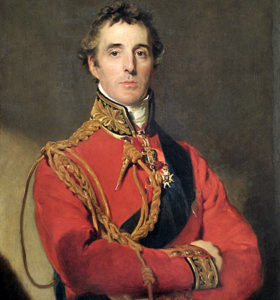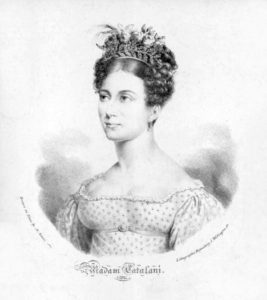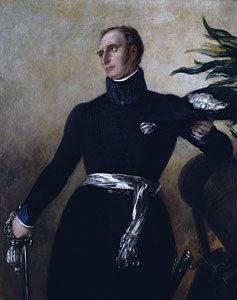This is the first of a series of Waterloo related posts we’ll be running in honour of the upcoming anniversary of the Battle on June 18th. We hope these posts will demonstrate how the Battle affected those in all walks of life, including the British ex-pats who, like Fanny Burney, were resident in Brussels at the time of the Battle.
A version of this post appeared in the Burney Letter, Vol. 21, No. 1, a publication of The Burney Society, Spring 2015; by Victoria Hinshaw.

“Upon reflection, I will write no account of these great events, which have been detailed so many hundred times, and so many hundred ways, as I have nothing new to offer upon them; I will simply write the narrative of my own history at that awful period.”
With this modest declaration, Frances Burney, Madame D’Arblay, describes her famous account of Brussels during time leading up to, during, and after the Battle of Waterloo in 1815. In vivid terms, she chronicles the tension and anxiety felt by the helpless people waiting for their fate to be decided.
General Alexandre d’Arblay (1748-1818), Burney’s beloved husband, even at the age of 66, served King Louis XVIII in his personal Guard. The d’Arblays occupied a residence in Paris, and had an active life there. But when Napoleon escaped from Elba in March 1815 and headed for Paris, assembling a powerful army as he came, Louis fled. He had been restored to the throne for just over a year and now abandoned Paris and crossed Belgian border to the relative safety of the United Netherlands. d’Arblay had to accompany the King, but he insisted his wife should accompany their friend the Princess d’Heinin into Belgium as well, not a simple task it turned out. Many British families lived in Brussels at the time, having taken advantage of the Peace of 1814 to enjoy a stay on the continent, which they had been unable to visit during the Napoleonic Wars. Like most of the world, they were shocked when Napoleon Bonaparte suddenly returned to France; Paris was about 160 miles from Brussels.
Once she reached Brussels, Madame d’Arblay found many friends among the French evacuees and the ex-pat English as well. When her husband was able to join her for several weeks, she was blissful. They even got to travel a bit and sightsee at the Palace of Lachen: “my dearest friend (the General, her husband) indulged in one morning’s recreation, which proved as agreeable as anything at such a period could be to a mind oppressed like mine. He determined that we should visit the Palais de Lachen, which had been the dwelling assigned as the palace for the Empress Josephine by Bonaparte at the time of his divorce. My dearest husband drove me in his cabriolet, and the three gentlemen whom he invited to be of the party accompanied us on horseback. The drive, the day, the road, the views, our new horses-all were delightful, and procured me a short relaxation from the foresight of evil.

“The Palace of Lachen was at this moment wholly uninhabited, and shown to us by some common servant. It is situated in a delicious park d’Anglaise, and with a taste, a polish, and an elegance that clears it from the charge of frippery or gaudiness, though its ornaments and embellishments are all of the liveliest gaiety. There is in some of the apartments some Gobelin tapestry, of which there are here and there parts and details so exquisitely worked that I could have ‘hung over them enamoured.”

While together, the couple also had the opportunity of attending a concert at which they observed the Duke of Wellington, Commander of the Allied Armies. “Our last entertainment here was a concert in the public and fine room appropriated for music or dancing. The celebrated Madame Catalani had a benefit, at which the Queen of the Netherlands was present, not, however, in state, though not incognita; and the king of warriors, Marshal Lord Wellington, surrounded by his staff and all the officers and first persons here, whether Belgians, Prussians, Hanoverians, or English.

I looked at Lord Wellington watchfully, and was charmed with every turn of his countenance, with his noble and singular physiognomy and his eagle eye. He was gay even to sportiveness all the evening, conversing with the officers around him. He never was seated, not even a moment, though I saw seats vacated to offer to him frequently. He seemed enthusiastically charmed with Catalani, ardently applauding whatsoever she sung, except the “Rule Britannia”; and there, with sagacious reserve, he listened in utter Silence. Who ordered it I know not, but he felt it was injudicious in every country but our own to give out a chorus of ‘Rule, Britannia! Britannia, rule the waves!’ “And when an encore began to be vociferated from his officers, he instantly crushed it by a commanding air of disapprobation, and thus offered me an opportunity of seeing how magnificently he could quit his convivial familiarity for imperious dominion when occasion might call for the transformation.”
The d’Arblay’s idyll ended when the General was sent off to Luxembourg to recruit soldiers for the royal cause. Frances was left alone to worry and share the concerns of her friends, some bordering on hysteria, as tension steadily increased in the next few weeks. Everyone knew the battle was approaching.
“May 13, 1815. My best friend left me to begin his campaign; left me, by melancholy chance, upon his birthday (67th). I could not that day see a human being — I could but consecrate it to thoughts of him who had just quitted me yet who from me never was, never can be, mentally absent, and to our poor Alexander (their son), thus inevitably, yet severely cast upon himself.”
For the month following his departure, she visited with friends, strolled in the park, attended church, and observed everything with her keen eye for detail. She also spent many hours alone, writing and worrying about her son, not doing as well at Cambridge as his parents expected, and particularly about her husband. One of Burney’s most fascinating observations was her view of the Belgian people, for the most part stoic and phlegmatic. As she observed, they had been traded back and forth between warring factions for centuries, spending most of the last decade as part of Napoleon’s Empire. How indeed could they get excited about another change in status? They seemed placidly to accept their fate, to Frances’s incredulity and sometimes consternation. “But even in the midst of the unconcerned populace, tensions rose as the streets were crowded with military vehicles horses and soldiers everywhere.”

She had a near-encounter with the notorious Lady Caroline Lamb*, whose affair with Byron had shocked London. Burney writes, “… I just missed meeting the famous Lady Caroline Lamb … whom I saw crossing the Place Royale,… dressed, Or rather not dressed, so as to excite universal attention, and authorise every boldness of staring, from the general to the lowest soldier, among the military groups then constantly parading the Place, — for she had one shoulder, half her back, and all her throat and neck, displayed as if at the call of some statuary for modelling a heathen goddess. A slight scarf hung over the other shoulder, and the rest of the attire was of accordant lightness. As her ladyship had not then written, and was not, therefore, considered as one apart, from being known as an eccentric authoress, this conduct and demeanour excited something beyond surprise, and in an English lady provoked censure, if not derision, upon the whole English nation.”
Aside from amusement at Burney’s disapproval of the attire, it is interesting to speculate about whether she thought of herself as an ‘eccentric author’ and thus ‘beyond surprise.’ This was a time of considerable unease for her. “During this melancholy period when leisure, till now a delight, became a burthen to me, I could not call my faculties into any species of intellectual service; all was sunk, was annihilated in the overpowering predominance of anxiety for the coming event.”
We take up Burney’s account of Brussels again on the day of the Battle of Quatre Bras. “I was again awakened at about five o’clock in the morning Friday, 16th June, by the sound of a bugle in the March aux Bois: I started up and opened the window. But I only perceived some straggling soldiers, hurrying in different directions, and saw lights gleaming from so many of the chambers in the neighbourhood: all again was soon still, and my own dwelling in profound silence, and therefore I concluded there had been some disturbance in exchanging sentinels at the various posts, which was already appeased: and I retired once more to my pillow, and remained till my usual hour… ”
Continuing, she writes, “my ears were alarmed by the sound of military music, and my eyes equally struck with the sight of a body of troops marching to its measured time. But I soon found that what I had supposed to be an occasionally passing troop, was a complete corps; infantry, cavalry artillery, bag and baggage, with all its officers in full uniform, and that uniform was black…. I learned it was the army of Brunswick. How much deeper yet had been my heartache had I foreknown that nearly all those brave men, thus marching on in gallant though dark array, with their valiant royal chief at their head, the nephew** of my own king, George III., were amongst the first destined victims to this dreadful contest, and that neither the chief, nor the greater part of his warlike associates, would within a few short hours, breathe again the vital air!”

“What a day of confusion and alarm did we all spend on the 17th!…That day, and June 18th, I passed in hearing the cannon! Good heaven! what indescribable horror to be so near the field of slaughter! such I call it, for the preparation to the ear by the tremendous sound was soon followed by its fullest effect, in the view of the wounded, the bleeding martyrs to the formidable contention that was soon to terminate the history of the war. And hardly more afflicting was this disabled return from the battle, than the sight of the continually pouring forth ready-armed and vigorous victims that marched past my windows to meet similar destruction.”
Burney writes that they had received “Many offers of escort out of Brussels were discussed and several attempted but none were successful. The military had confiscated all vehicles and barges destined for the roads and canals to Antwerp or Ostend.” Amidst reports on her conversations with those trying to escape, she wrote: “I found upon again going my rounds for information, that though news was arriving incessantly from the scene of action, and with details always varying, Bonaparte was always advancing…Yet no clamour, no wrangling, nor even debate was intermixed with either question or answer; curiosity, though incessant, was serene; the faces were all monotony, though the tidings were all variety. I could attribute this only to the length of time during which the inhabitants had been habituated to change both of masters and measures, and to their finding that, upon an average, they neither lost nor gained by such successive revolutions…No love of liberty buoyed up resistance; no views of independence brightened their imagination; and they bore even suspense with the calm of apparent philosophy, and an exterior of placid indifference.”
These are just a few of her observations, but I have attempted to choose the most relevant ones. At last, we come to the day of the main battle.”But what a day was the next — June 18 — the greatest, perhaps, in its result, in the annals of Great Britain!…” Despite the streets full of people, “when every other hour changed the current of expectation, no one could be inquisitive without the risk of passing for a spy, nor communicative without the hazard of being suspected as a traitor.” Her friend Mr. Boyd “…feared all was lost-that Bonaparte was advancing-that his point was decidedly Brussels-and that the Duke of Wellington had sent orders that all the magazines, the artillery, and the warlike stores of every description, and all the wounded, the maimed, and the sick, should be immediately removed to Antwerp. For this purpose he had issued directions that every barge, every boat should be seized.
“The dearth of any positive news from the field of battle, even in the heart of Brussels, at this crisis, when everything that was dear and valuable to either party was at stake, was at one instant nearly distracting in its torturing suspense to the wrung nerves, and at another insensibly blunted them into a kind of amalgamation with the Belgic philosophy. At certain houses, as well as at public offices, news, I doubt not, arrived; but no means were taken to — promulgate it — no gazettes, as in London, no bulletins, as in Paris, were cried about the streets; we were all left at once to our conjectures and our destinies. What a dreadful day did I pass! dreadful in the midst of its glory! for it was not during those operations that sent details partially to our ears that we could judge of the positive state of affairs, or build upon any permanency of success. Yet here I soon recovered from all alarm for personal safety, and lost the horrible apprehension of being in the midst of a city that was taken, sword in hand, by an enemy — an apprehension that, while it lasted, robbed me of breath, chilled my blood, and gave me a shuddering ague that even now in fancy returns as I seek to commit it to paper.”
Eventually Burney heard an account from a witness to the battle; “Mr. Saumarez’s narration was all triumphant and his account of the Duke of Wellington might almost have seemed an exaggerated panegyric if it had painted some warrior in a chivalresque romance. . . . I could not but be proud of this account: independent from its glory; my revived imagination hung the blessed laurels of peace. But though Hope was all alive, Ease and Serenity were not her companions: Mr. Saumarez could not disguise that there was still much to do, and consequently to apprehend; and he had never, he said, amongst the many he had viewed, seen a field of battle in such excessive disorder. Military carriages of all sorts, and multitudes of groups unemployed, occupied spaces that ought to have been left for manoeuvring or observation. I attribute this to the various nations who bore arms on that great day in their own manner; though the towering generalissimo of all cleared the ground, and dispersed what was unnecessary at every moment that was not absorbed by the fight.”
As she returned to her lodging, “Three or four shocking sights intervened during my passage, of officers of high rank, either English or Belge, and either dying or dead, extended upon biers, carried by soldiers. The view of their gay and costly attire, with the conviction of their suffering, or fatal state, joined to the profound silence of their bearers and attendants, was truly saddening; and if my reflections were morally dejecting, what, oh what were my personal feelings and fears, in the utter uncertainty whether this victory were more than a passing triumph!”
Though confident of victory, no one knew at the moment that for all practical purposes, Napoleon’s reign was over and peace would soon be restored to Europe.

“It was not till Tuesday, the 20th, I had certain and satisfactory assurances how complete was the victory. At the house of Madame de Maurville I heard confirmed and detailed the matchless triumph of the matchless Wellington, interspersed with descriptions of scenes of slaughter on the field of battle to freeze the blood, and tales of woe amongst mourning survivors in Brussels to rend the heart. While listening with speechless avidity to these relations, we were joined by M. de la Tour du Pin, who is a cousin of Madame de Maurville, and who said the Duke of Wellington had galloped to Brussels from Wavre to see the Prince of Orange and inquire in person after his wounds. Prince Blucher was in close pursuit of Bonaparte, who was totally defeated, his baggage all taken, even his private equipage and personals, and who was a fugitive himself, and in disguise! The duke considered the battle to be so decisive, that while Prince Blucher was posting after the remnant of the Bonapartian army, he determined to follow himself as convoy to Louis XVIII.”
Even so, the ordeal of Brussels and its inhabitants was not finished. Burney writes, “the duke now ordered that the hospitals, invalids, magazines, etc., should all be stationed at Brussels, which he regarded as saved from invasion and completely secure. It is not near the scene of battle that war, even with victory, wears an aspect of felicity-no, not even in the midst of its highest resplendence of glory…For more than a week from this time I never approached my window but to witness sights of wretchedness. Maimed, wounded, bleeding, mutilated, tortured victims of this exterminating contest passed by every minute: the fainting, the sick, the dying and the dead, on brancards, in carts, in waggons, succeeded one another without intermission. There seemed to be a whole and a large army of disabled or lifeless soldiers! All that was intermingled with them bore an aspect of still more poignant horror; for the Bonapartian Prisoners who were now poured into the city by hundreds.
“Everybody was wandering from home; all Brussels seemed living in the streets. The danger to the city, which had imprisoned all its inhabitants except the rabble or the military, once completely passed, the pride of feeling and showing their freedom seemed to stimulate their curiosity in seeking details on what had passed and was passing. But neither the pride nor the joy of victory was anywhere of an exulting nature.” She heard stories from participants, but nothing could quell her horror. “I met at the embassy an old English officer who gave me most interesting and curious information, assuring me that in the carriage of Bonaparte, which had been seized, there were proclamations ready printed, and even dated from the palace of Lachen, announcing the downfall of the Allies and the triumph of Bonaparte ! But no satisfaction could make me hear without deadly dismay and shuddering his description of the field of battle. Piles of dead! — Heaps, masses, hills of dead bestrewed the plains.
“Thousands, I believe I may say without exaggeration, were employed voluntarily at this time in Brussels in dressing wounds and attending the sick beds of the wounded. Humanity could be carried no further; for not alone the Belgians and English were thus nursed and assisted, nor yet the Allies, but the prisoners also; and this, notwithstanding the greatest apprehensions being prevalent that the sufferers, from their multitude, would bring pestilence into the heart of the city.”
Frances Burney, Madame d’Arbly, remained in Brussels for almost a month after the battle. She learned that the wars were over on June 26. “We were all at work more or less in making lint. For me, I was about amongst the wounded half the day, the British, s’entend! The rising in France for the honour of the nation now, and for its safety in independence hereafter, was brilliant and delightful. On the following Sunday I had the gratification of hearing, at the Protestant chapel, the Te Deum for the grand victory, in presence of the King and Queen of the Low Countries — or Holland, and of the Dowager Princess of Orange, and the young warrior her grandson. This prince looked so ill, so meagre, so weak, from his half-cured wounds, that to appear on this occasion seemed another, and perhaps not less dangerous effort of heroism, added to those which had so recently distinguished him in the field.”
These are only a portion of Frances Burney’s memoirs of the period. They were chosen from the on-line version of the Diary and Letters of Madame d’Arblay edited by her Niece Charlotte Barrett, Volume IV, available on Google Books. Also used was Fanny Burney: Selected letters and Journals edited by Joyce Hemlow, published in 1986. A postscript to her time in Belgium was Madame d‘Arblay’s audacious journey to reach her husband in July, 1815. While still in the King’s service, he had been injured by the kick of a horse, a wound to his leg from which he never fully recovered. Alone and without complete papers and passports, she set out from Brussels, determined to get to him. Traveling conditions in the region were disrupted and confusing, but she was intrepid and eventually, she was reunited with “her best friend.” Over the next few weeks, while she nursed him, they assembled their belongings in Paris, secured his release from the King’s service, and returned to England.
*Lady Caroline Lamb (1785-1828) was the daughter of the 3rd Earl of Bessborough and his wife Harriet/Henrietta; niece of Georgiana, Duchess of Devonshire; wife of Frederick Lamb, future Lord Melbourne and future Prime Minister. Lady Caroline‘s brother Frederick Ponsonby of the 12thLight Dragoons, was severely wounded in the Battle of Waterloo. She published her first novel, a roman a clef about Byron, in 1816.
**Frederick William, Duke of Brunswick-Wolfenbuttel (1771-16 June 1815), known as The Black Duke, was also the brother of the Prince Regent’s wife Caroline of Brunswick; he died at the Battle of Quatre Bras.
Frances Burney (1752-1840) wrote four novels, many plays, and her renowned Journals, currently being re-issued. For more information on Fanny and her family, visit the website of The Burney Centre at McGill University, Montreal, here.

